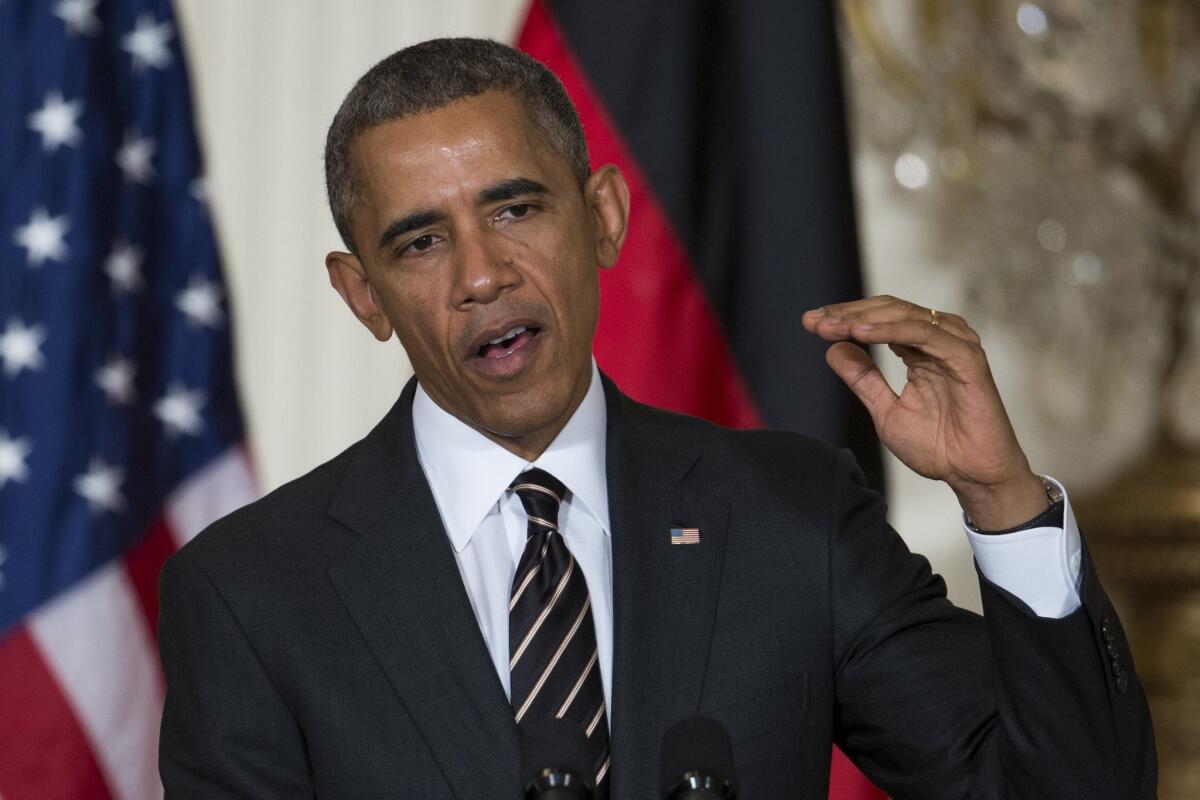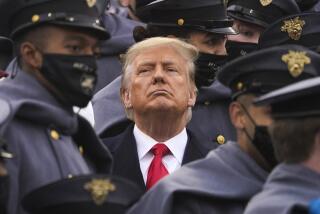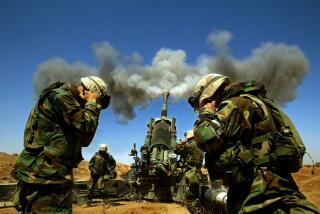Obama asks Congress to back fight against Islamic State, but is vague on limits

- Share via
Reporting from Washington — President Obama formally asked Congress to authorize military operations against Islamic State, seeking to put lawmakers on record in support of a Middle East conflict that seems likely to intensify in coming months and last beyond the end of his time in office.
After promising for years to curb the parameters of his own powers to wage war, Obama proposed a resolution Wednesday that sets relatively few hard limits on him or the next president. It also would not touch the post-Sept. 11 authorization to use the military against “international terrorism,” which he has warned leaves the U.S. in a permanent state of war.
The request will open a potentially lengthy argument over U.S. involvement in the fight against militant Islamic groups in Iraq and Syria. That debate is likely to pit the president against his fellow Democrats, many of whom are deeply skeptical of military action.
The request comes as the Pentagon prepares for a stepped-up period in the fight against Islamic State militants. Iraqi government forces are expected this year to begin trying to wrest back major cities from extremist control, including Mosul, Iraq’s second-largest.
U.S. commanders have made clear they’re likely to ask Obama to authorize American troops to take part in that operation, although not as front-line combat troops. U.S. personnel might serve in roles such as advisors and spotters to guide airstrikes.
Obama contends that he already has authority for such deployments under the 2001 authorization permitting use of force against Al Qaeda, which once had ties to Islamic State, as well as the 2002 sanctioning of the Iraq war. Because of that legal authority, the new proposal would not add to his ability to order troops into harm’s way. But, the White House argues, it would force lawmakers to assume more of the responsibility —and political heat — for a conflict with no end in sight.
As he faces a new Republican-controlled Congress and an ever-shrinking window for action, Obama said it was time to give troops a “clear strategy and the support they need to get the job done.”
“As a nation, we need to ask the difficult and necessary questions about when, why and how we use military force,” Obama said Wednesday.
The resolution, which would expire in three years, sets no geographic boundaries on U.S. operations against Islamic State, also known as ISIL or ISIS, and uses just five words to limit the type of operations Obama or his successor could order.
A president could not deploy U.S. troops for “enduring offensive ground combat operations,” the measure states, using a phrase the White House acknowledged was intentionally “fuzzy” to allow flexibility.
That phrase was immediately among the points of contention, particularly within Obama’s party. Several leading Democratic lawmakers have said they want to see tighter, more specific restrictions on use of U.S. forces and expressed fears that another president — perhaps a Republican — could use the measure to justify major ground operations on par with the wars in Iraq and Afghanistan, or a gradual creep in that direction.
“This is deadly serious. And I do think that in the country there is no appetite for any boots on the ground, except in limited circumstances,” Minority Leader Nancy Pelosi (D-San Francisco) said, noting that many in the party were still “burned” by the 2002 debate over the legislation ultimately used to launch the Iraq war.
“That scope is the debate that we will be engaged in,” she said.
The president’s proposal was aimed at allaying those concerns without turning off Republicans, who argue that hard limits on his power would send a dangerous message to an enemy and hamstring a future commander in chief. But many Republicans still saw too many restrictions.
“We should authorize the president to defeat ISIL, and leave it to the commander in chief — both the one we have now and the one we’ll have in the future — to do what it takes to defeat them,” said Sen. Marco Rubio (R-Fla.), who is frequently mentioned as a possible presidential candidate in 2016.
One indication that the battle against Islamic State could shift in unforeseen ways is the flood of foreign fighters who have flocked to Syria to join that militant group or others. More than 20,000 people have come from elsewhere to join extremist groups in Syria since 2011, more than the number of foreigners who joined conflicts in Afghanistan, Iraq, Yemen or Somalia over the last two decades, a top terrorism official told lawmakers Wednesday.
The flood of fighters to Syria is “unprecedented” and “going up,” said Nicholas J. Rasmussen, director of the National Counterterrorism Center.
In a letter to Congress accompanying his proposal, Obama sought to clarify what the language would permit, including rescue missions, training of foreign forces and deploying troops to help identify strike targets. Spokesman Josh Earnest would not put a time frame on what the White House considers “enduring.”
Robert Chesney, a national security law professor at the University of Texas School of Law, said the phrase was an attempt to use “strategic ambiguity” to please both sides.
“This is not a recognized legal category, to put it mildly,” he said. “It’s a fudge phrase to gesture simultaneously in the direction of, ‘We’re not going to have a war with boots on the ground, except we’re going to have lots of boots on the ground doing war-related things.’”
For the White House, the stakes behind winning congressional approval are primarily political, with ramifications for Obama’s pursuit of a legacy as the president who ended George W. Bush-era war policies.
“It’s time for Congress to step up to the plate,” Earnest said.
But it is likely to have little immediate impact on Pentagon operations.
The U.S.-led coalition of countries taking on Islamic State has been conducting military operations, primarily bombings, against the extremist group for more than seven months. It has hit 4,817 Islamic State targets in 2,363 strikes since operations began Aug. 8, the Pentagon says.
Some Democrats argued that although the White House’s proposal allowed Congress to weigh in, the measure would do nothing in practice to place a check on the president’s war powers.
Although the proposed new resolution would repeal the 2002 authorization and replace it with the language tailored for Islamic State, it would leave in place the broader 2001 authorization. The resolution also does not state which measure supersedes the other.
The effect is to “simply expand the president’s already broad statutory authorities, while doing nothing to ensure public deliberation and congressional accountability,” a group of Democratic law professors, including some who served in the Clinton and Obama administrations, argued in a letter to the president this week.
Rep. Chris Van Hollen of Maryland, who was among the House Democrats who worked most closely with the White House on the draft, called the ground troops language “overly broad.”
“It makes little sense to place reasonable boundaries on the executive’s war powers against ISIL while leaving them unchecked elsewhere,” he said.
“What they’re proposing goes into the next administration as well. And we have to be very mindful that the next president might not take the same view of the commitment of American forces that this one does,” said Rep. Adam B. Schiff (D-Burbank), who has introduced a more restrictive proposal that also would add a sunset clause to the 2001 authorization.
Contemplating what a future president might do, Schiff said, “gives a lot of heartburn to our caucus.”
kathleen.hennessey @latimes.com
michael.memoli @latimes.com
Times staff writers W.J. Hennigan and Brian Bennett in Washington contributed to this report.
More to Read
Get the L.A. Times Politics newsletter
Deeply reported insights into legislation, politics and policy from Sacramento, Washington and beyond. In your inbox twice per week.
You may occasionally receive promotional content from the Los Angeles Times.












